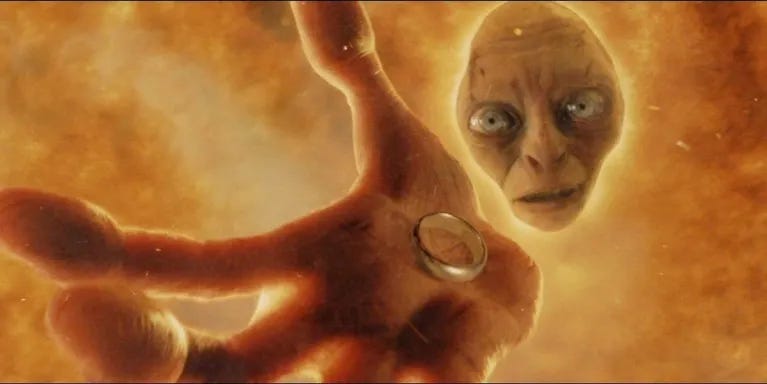The Eye of Jabaari: Why institutions are blinded by pedigree.
Winner Winner Wednesday
Winner Winner Wednesday
Hi there! If you’re new to the blog, welcome to Winner Winner Wednesday. On Wednesdays around here we talk about winners: chads and stacies, kings and queens, conquerors and conquistadors- the brave and the bold who have sought and won the throne, cost be damned. Today, we’re going to be talking about essential tools on most winners’ utility belt: prestige & pedigree.
Meritocracy and Moral Worth
I recently read a really interesting article that nodded to the idea that merit has become a proxy for moral worth. Society is desperate to find scales by which to weigh the just and unjust, and standardized tests and filtering processes aren't perfect, but outpace biological succession by a mile in terms of fairness.
I write and read a lot about meritocracy. And find that most of the emotion in discourse can be sourced to the beginning of the talk as the origin of the word "meritocracy" itself, Michael Young’s The Rise of Meritocracy. It's a satirical text in which the lower classes rebel because meritocracy dictates those on the bottom are there because they deserve it, not because of their birth order.
All argument about meritocracy pretty much boils down to this essential question of moral worth. Those who criticize the accuracy of meritocratic measurements do so because they improperly sort the worthy and worthless. Those who praise meritocracy do so because it asserts a "proper" societal order.
I think my preferred approach is one of moderation: meritocracy can be used to established a minimum viability of skill for positions, but once you reach the top 20% of the skill distribution (if we’re going by Pareto) it falls into subjective wrangling. If we could get over ourselves and accept that meritocratic process isn't a silver bullet, but a bullet nonetheless, we could be much more effective in our institutional filtering by approaching existing merit skeptically and taking a "trust-but-verify" approach.
Instead, passing certain societal filters- like getting into an ivy or working at a FAANG company- establish what I jokingly refer to as: “The Eye of Jabaari”
Kerostasia (the weighing of souls)
What exactly is “The Eye of Jabaari?” It’s how I like to refer to the idea of a “prestige stamp” - what many people would call pedigree. I dress it up in fantasy guise because I’m a fantasy buff, but I feel that power and allure of pedigree are one of the few things in society actually deserving of such fantastic treatment. We seek prestige like Gollum seeks The One Ring.
A prestige stamp is anything that marks you as having passed through a particularly difficult societal filter. Have an Ivy League school on your resume? That’s a prestige stamp. Do some time in a FAANG gulag? Prestige stamp. Go to the Olympics? Win a Pulitzer? Granted a Medal of Honor? Prestige stamp, prestige stamp, prestige stamp.
We live in a society that likes to perceive itself as purely meritocratic. We use skill, intelligence, and ability as proxies for moral worth. Societal filters serve the role of Archangel Michael/ Minos / Anubis to witness the weighing of our souls. Those who pass muster are meritorious, deserving of praise and destined in their right to the riches of the world.
The procession of societal filters and their outcomes conspire to create meritocratic pedigree. The elite are those who have, battle tested, sought and won the gauntlet of merit not just once, but continually throughout their lives.
This would all be well and good if not for the more archaic (yet still very much in-play) definition of pedigree: being born of noble lineage. It’s no wonder we’ve bastardized the word; noble or wealthy birth and prestigious education and work history are often synonymous. I’m forced to remember (though I hate that I can) every line in every Hunger Games clone in which the narrator extolls how unfair it is that children from the wealthy districts have trained all their lives for the games.
Ancient China’s examination system for imperial scholars had this issue:
…ancient practice restricted access to imperial posts and created a rarefied “mandarin” class surrounded by a majestic aura. It is possible that he was also aware of a pitfall of the Chinese system: by the nineteenth century, the Qing dynasty was struggling with an overabundance of successful applicants, trained from childhood by private tutors to pass the exam. With public posts more than adequately filled, many degree holders were idle, reluctant to engage in labors beneath their dignity. Under these conditions, imperial examiners were forced to find technical grounds for rejecting applicants aside from their performance on the test.
Meritocratic process are often intentionally slow to reform so as to protect fairness (and symbiotic industries, like test prep). That slowness in reform makes it possible to make money as a professional, guiding others through a process to which they will only submit once, yet to which all must submit. The wealthy can afford to indirectly buy pedigree by paying for professional coaching to gain access to the knowledge and experience of all those one-way trips. This is why we still see meritocracy bias towards rich and established families, rather than representing a random distribution of individuals who ostensibly have the same odds.
There is, however, another reason that rich get richer in meritocracies. Success is cumulative. When being evaluated for one filter, the evaluators must look back into your past to see what other filters you have passed up to now.
Enter with me, for a brief moment, a fantastical metaphor:
The Valley of Judgement
To seek glory and worth, aspirants pass through the valley of judgement, under the statues of storied kings and conquerors. Great, sociomeritocratic stone eyes stare into the visage of every visitor, undressing to the soul all that beg audience for a job or degree- turning the unworthy away. Should they meet, however, the gaze of another cold stone eye, they pass over it- knowing its holder has passed under greater statues, greater filters, than themselves. Only after a petitioner has passed the valley of judgement might they sit true tests of skill under the oracles- who are blind to the influence of man, but all-seeing in the deftness of work.
The Eye of Jabaari is a magical seal that grants its wearer safe passage through institutional filters. Should a filter fail, it will be removed- for that reason the safest choice any filter can make is to agree with older, more storied, more tested filters. If you are a hiring manager trying to make the safest decision for your team, or the one least likely to get you fired in the case of failure, you want to be able to point at another societal filter and say "It's not my fault- I thought they were legit, they graduated from Harvard!" For this reason, as a bureaucracy grows, so too does the length of the valley of judgement - each judge must defend their decision, and will look for the seal of prior judges to do so.
New organizations start out with no valley of judgement. I think the tech industry, for all its failings, did a really good job in its early days of disregarding the eye. But then it encysted, the recruiters arrived from other corners of the globe, and as the money and bureaucracy grew, so too did the aversion to risk and the need for signifiers to power defensive decision making. These days there is a longer walk through the valley before one reaches the oracles.
Whether or not the oracles actually do good work is another topic of discussion. As I said at the beginning, I think tests of skill are only good to establish a minimum threshold of ability. Once you have winnowed a pool of applicants to those who can actually do the job, or play the instrument, or pass the classes, or score the goals- then you are into the realm of subjectivity and opinion, and that is a realm to which merit has no relevance.
Stone eyes; blind eyes
Why are our institutions susceptible to such sorcery? It boils down to the need for markers and stereotyping to efficiently sort large talent pools. I think one aspect that very few people remember to discuss when talking about meritocratic hiring process is the material goal: you are trying to ensure the lowest rate of false positives possible.
What I mean here is that while it is acceptable to interview and reject a qualified candidate, it is unacceptable to interview and accept an unqualified one. When the number of qualified applicants is low, the likelihood of admitting unqualified applicants is higher. The worse the filter, the weaker the draw, the fewer the candidates, the more chance their is for false positives and further decrease in status.
Often the whole point of a societal filter in itself selectivity, not merit. Up until 2018, US News and World Report ranked schools by looking at the exclusivity of admissions.
A filter’s goals are therefore:
To generate as much interest as possible from which to select a small number of candidates.
To avoid admitting unqualified candidates at any cost.
Turning away qualified applicants only serves to increase the status of an institution. The more selective the filter, the more powerful the prestige stamp. Not only that, but every successful candidate now has vested interest in ensuring the validity of their own prestige stamps, and will fight to maintain the sanctity of the filtration process.
This approach of mass appeal followed by high selectivity requires the bureaucratic capability to quickly classify and sort thousands of applicants in parallel. It’s impossible to do this by comparison in large talent pools, so instead the initial winnowing is performed by stereotyping: Does this person seem worthy? The stereotype that prestigious individuals won their positions through merit is ironclad in our society.
The reason that the Eye of Jabaari works the way it does is because the surest marker of worth is to have already been declared worthy by another respectable filter. Since the process is focused on removing false positives, candidates with institutional signoff are subject to much less scrutiny. This is a compounding effect, making it so that each filter passed only lends more credence to the narrative that a candidate is qualified, even if all of those institutions were just cribbing eachother’s notes.
In “The Valley of Judgement” section above, I mention that tech was corrupted as it gained outside influence in recruiting:
“…the tech industry, for all its failings, did a really good job in its early days of disregarding the eye. But then it encysted, the recruiters arrived from other corners of the globe”
The reason I said this is because outsiders brought a stereotyping, mass applicant recruitment process into an industry that had previously been preoccupied with ability rather than pedigree. Developers need to talk their way past recruiters in order to land a meeting with someone who can measure their actual ability. Even for jobs with small applicant pools, it’s now difficult to get your foot in the door without a prestige stamp, just like every other industry on the planet.
Conclusions
Meritocracy is blinded by past success. Filtering processes heavily scrutinize candidates who can’t show evidence of having already passed another filter, creating a “catch 22” effect for those without a prestige stamp or with unconvincing pedigree. Those fortunate enough to have passed through a great societal filter are rewarded with ‘The Eye of Jabaari,” a seal that grants them safe passage through the early stages of future filters.
If you enjoyed the article, please share it with all of your friends, your coworkers, your cousins, people who are next to you in line, or in the stall next to yours in a public bathroom. If you didn’t like this article, shout it from the rooftops- link to it with a large glaring neon sign that decries its merit and calls the author a smarmy ponce. Share it with your friends and have them do the same. Maybe still show it to the person in the toilet stall next to yours; you wouldn’t want to poop next to an idiot who enjoys this drivel.
As always, feel free to reach out in the comments or on twitter to ask me questions and provide commentary. Subscribe to the newsletter too, why don’t you? It’s not like you’re running out of inbox space.








